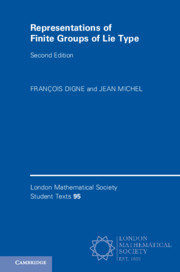Book contents
- Frontmatter
- Contents
- Introduction to the Second Edition
- From the Introduction to the First Edition
- 1 Basic Results on Algebraic Groups
- 2 Structure Theorems for Reductive Groups
- 3 (B,N)-Pairs; Parabolic, Levi, and Reductive Subgroups; Centralisers of Semi-simple Elements
- 4 Rationality, the Frobenius Endomorphism, the Lang–Steinberg Theorem
- 5 Harish-Chandra Theory
- 6 Iwahori–Hecke Algebras
- 7 The Duality Functor and the Steinberg Character
- 8 ℓ-Adic Cohomology
- 9 Deligne–Lusztig Induction: The Mackey Formula
- 10 The Character Formula and Other Results on Deligne–Lusztig Induction
- 11 Geometric Conjugacy and the Lusztig Series
- 12 Regular Elements; Gelfand–Graev Representations; Regular and Semi-Simple Characters
- 13 Green Functions
- 14 The Decomposition of Deligne–Lusztig Characters
- References
- Index
Introduction to the Second Edition
Published online by Cambridge University Press: 14 February 2020
- Frontmatter
- Contents
- Introduction to the Second Edition
- From the Introduction to the First Edition
- 1 Basic Results on Algebraic Groups
- 2 Structure Theorems for Reductive Groups
- 3 (B,N)-Pairs; Parabolic, Levi, and Reductive Subgroups; Centralisers of Semi-simple Elements
- 4 Rationality, the Frobenius Endomorphism, the Lang–Steinberg Theorem
- 5 Harish-Chandra Theory
- 6 Iwahori–Hecke Algebras
- 7 The Duality Functor and the Steinberg Character
- 8 ℓ-Adic Cohomology
- 9 Deligne–Lusztig Induction: The Mackey Formula
- 10 The Character Formula and Other Results on Deligne–Lusztig Induction
- 11 Geometric Conjugacy and the Lusztig Series
- 12 Regular Elements; Gelfand–Graev Representations; Regular and Semi-Simple Characters
- 13 Green Functions
- 14 The Decomposition of Deligne–Lusztig Characters
- References
- Index
Summary
We had two main aims in writing this edition:
Be more self-contained where possible. For instance, we have added brief overviews of Coxeter groups and root systems, and given some more details about the theory of algebraic groups.
While retaining the same level of exposition as in the first edition, we have given a more complete account of the representation theory of finite groups of Lie type.
In view of the second aim, we have added the following topics to our exposition:
We cover Ree and Suzuki groups extending our exposition of Frobenius morphisms to the case more general of Frobenius roots.
We have added to Harish-Chandra theory the topic of Hecke algebras and given as many results as we could easily do for fields of arbitrary characteristic prime to q, in view of applications to modular representations.
We have added a chapter on the computation of Green functions, with a brief review of invariant theory of reflection groups, and a chapter on the decomposition of unipotent Deligne–Lusztig characters.
- Type
- Chapter
- Information
- Publisher: Cambridge University PressPrint publication year: 2020

